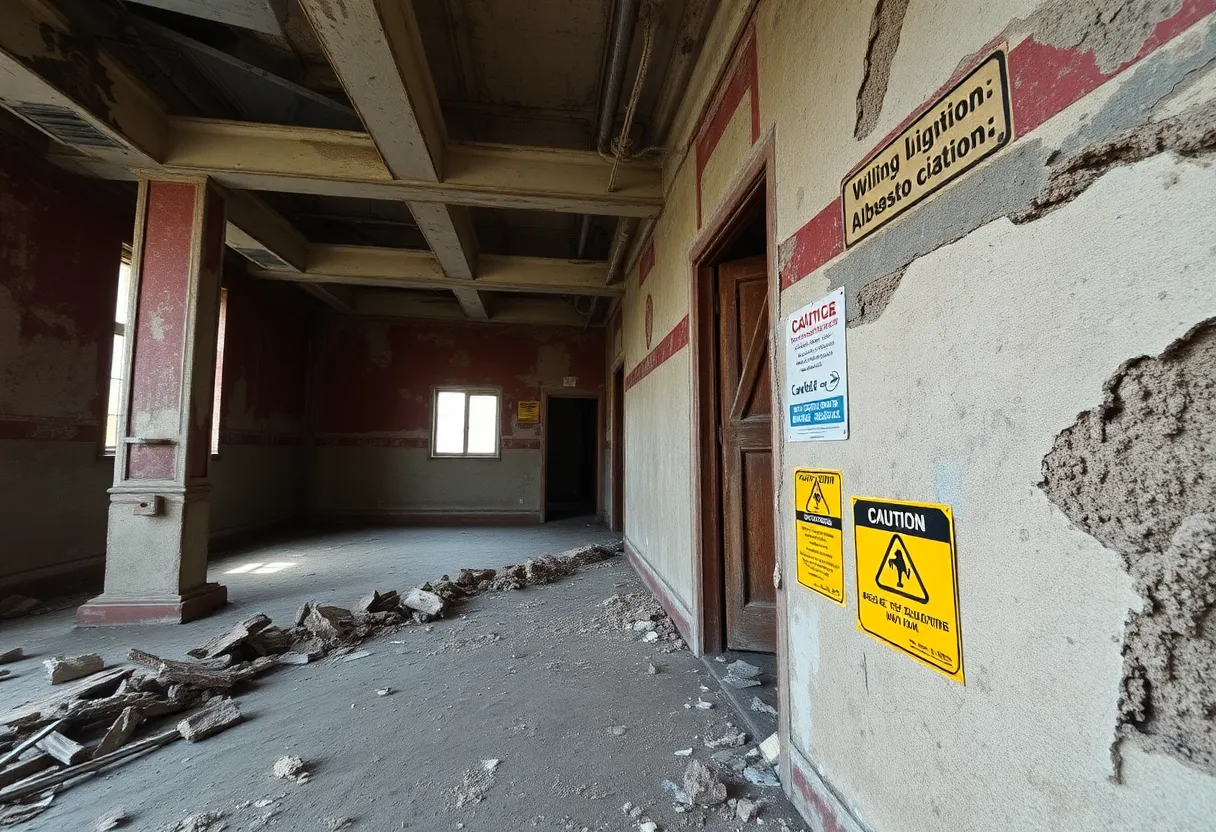News Summary
As discussions on social media about discovering hidden flooring spark excitement, the potential dangers of asbestos come to light. This article explores the serious health risks linked to asbestos exposure, particularly in schools, where mismanagement and lack of awareness persist. With many school buildings still containing asbestos, raising public consciousness and improving safety management is critical for protecting future generations from this silent killer.
The Hidden Dangers of Asbestos: What You Need to Know
Across the UK, social media platforms like TikTok are buzzing with stories of individuals discovering old flooring beneath carpets, leading them on treasure hunts for hidden beauty like parquet or tiles. However, excitement often turns to concern—especially for users like Holli, who unearthed mysterious dark tiling under her vintage red carpet. To her dismay, tests confirmed the tiles contained a staggering 10% asbestos.
The Asbestos Threat
Many may not realize that asbestos, a naturally occurring mineral once widely used as a building material in the UK from the 1930s until the late 1970s, poses severe health risks when inhaled. Common applications included popcorn ceilings, vinyl floor tiles, drywall, and insulation. While regulations began to tighten in the 1980s, the complete ban of asbestos in the UK was only implemented in 1999.
The Health and Safety Executive (HSE) has warned that disturbing asbestos-containing materials can release hazardous fibers into the air, raising alarms about the long-term health consequences that can manifest years later. As such, diseases linked to asbestos, including lung cancer and asbestosis, can be fatal once diagnosed.
Public Awareness and Safety Concerns
The recent findings of dumped asbestos materials in Sammie’s Wood, Gloucestershire, have heightened public debates concerning disposal practices and safety. Reaction from social media users varies, from alarmed warnings to suggestions to cover the tiles rather than risk exposure. Still, the significance of these reactions lies in the pressing need for awareness surrounding asbestos-related dangers.
Mesothelioma: The Silent Killer
Among the most serious health threats linked to asbestos is mesothelioma, a rare and aggressive form of cancer that often develops rapidly post-exposure. Once diagnosed, the prognosis remains bleak, with no effective cure. Alarmingly, studies indicate that women aged 40 to 60 who work in schools are at a statistically significant risk of developing mesothelioma due to long-term exposure to asbestos in those environments.
The Joint Union Asbestos Committee has estimated thousands of deaths in the UK are related to asbestos exposure in schools—significantly impacting not only teachers like Carole Hagedorn but also students who may unknowingly encounter this hidden peril.
The Alarming Statistics
Currently, approximately 81% of schools in the UK are reported to have asbestos present. This becomes more disconcerting as many children are believed to be at risk. The risks extend beyond current employees; health professionals often fail to recognize mesothelioma symptoms in non-high-risk professions, further complicating early detection and treatment efforts.
Management Practices Under Scrutiny
With the HSE endorsing “in-situ management”, which implies that asbestos may remain undisturbed and safe, questions about the effectiveness of this policy arise. Recent reports highlight that a considerable percentage of asbestos materials in UK buildings are damaged, emphasizing the urgent need for better management practices.
Advocacy groups and unions continuously press for improved strategies to address asbestos risks in educational institutions. As time progresses, there is an increasing call for a long-term strategy for the phased removal of asbestos from schools and public buildings, safeguarding the health of future generations.
The Financial Impact of Asbestos Removal
Removing asbestos can be a costly endeavor, with estimates for small areas reaching up to £1,200. Despite these financial implications, the risks associated with leaving asbestos unchecked are vastly greater. Effective training and awareness regarding asbestos safety remain strikingly low among many school staff and contractors, exposing a gap that needs urgent attention.
Conclusion: Rising to the Challenge
As we uncover the reality of asbestos exposure and its associated health risks, the need for heightened public awareness and improved management strategies becomes undeniable. All stakeholders, from health professionals to educators, must prioritize learning about the dangers of asbestos to protect our communities from its lasting effects.
Deeper Dive: News & Info About This Topic
HERE Resources
Widow’s Plea for Memories of Rugeley B Power Station Workers
Asbestos Concerns Spark Urgent Responses in School Renovations
Asbestos Violations Shake Oregon’s Construction Sector
Asbestos Removal Begins at Hutchinson High School
Chrysotile Asbestos Ban Sparks Fierce Legal Battle in Court
Cleanup Underway for $110 Million Housing Project in Downtown Dayton
The Asbestos Dilemma: New Report Creates Waves in NSW Management Policies
Asbestos Exposure Among Veterans: A Silent Epidemic
The Role of Chemotherapy in Mesothelioma Care
Sheffield Develops Innovative Breath Test for Mesothelioma Detection
Additional Resources
- BBC News Article: The Hidden Dangers of Asbestos
- Wikipedia: Asbestos
- The Conversation: The Hidden Danger of Asbestos in UK Schools
- Google Search: Asbestos in Schools
- The Guardian: The Hidden Health Hazard of Asbestos
- Google Scholar: Asbestos Health Risks
- BBC News: Asbestos Dumping in Gloucestershire
- Encyclopedia Britannica: Asbestos



















